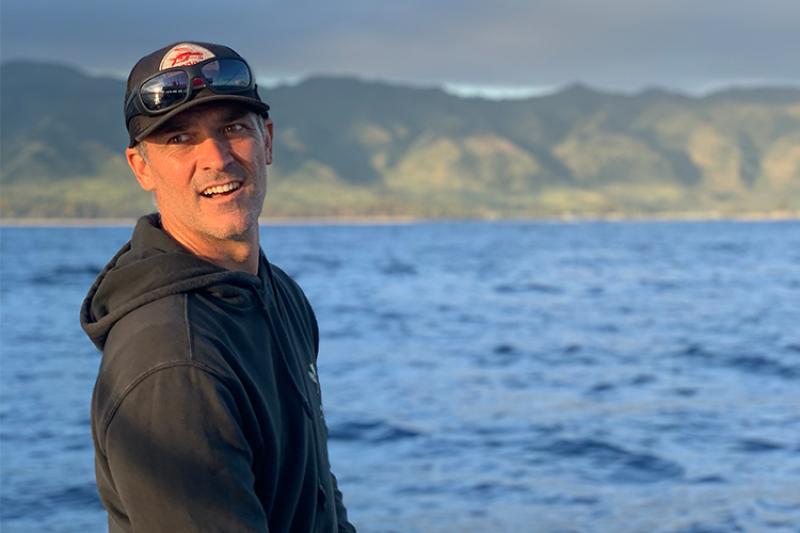What is your current job, and what are your key responsibilities?
I am a natural resources manager in the International Fisheries division of the NOAA Fisheries Pacific Islands Regional office. I help implement the South Pacific Fisheries Treaty between certain Pacific Island countries and the United States, which includes vessel licensing and maintaining current documentation for U.S. vessels tuna fishing across the western and Central Pacific Ocean. I also work with the Western and Central Pacific Fisheries Commission on international fisheries in the region. The Commission is responsible for setting tuna and other highly migratory species catch limits, high seas boarding, monitoring control and surveillance. It also supports small island developing states to enhance the capacity of their fisheries sectors. All of these are key to capacity building in the Pacific Island countries with which I work. The third element of my work is coordinating NOAA Fisheries’ policy implementation, especially those from the State Department, the United States Agency for International Development, and the Department of Defense across the Pacific islands region.
What does your typical day look like?
The vast majority of my day is spent bouncing between regulation documents and engaging in meetings with agency colleagues and foreign officials. Prior to COVID, I traveled extensively. While I coordinate with NOAA colleagues and local stakeholders in Hawai‘i, the majority of my day is spent engaging with other U.S. agencies and groups outside the U.S. government. These include regional fisheries management organizations or countries such as the Marshall Islands or Vanuatu.
What is your favorite part of your job?
By far my favorite part of my job is promoting and advancing U.S. values in the Pacific region. The United States is a global leader in sustainable seafood, and NOAA plays an active role in shaping the conservation and management of international fisheries. It’s an honor to serve in this role.
What was your educational background and career path that led you to NOAA Fisheries?
I completed my Bachelor of Science degree in hydrology and did a B.A. in geography, followed by a Ph.D. in oceanography at Rutgers University. Afterward, I received a postdoc at the Palmer Research Station in Antarctica. While there, I was inspired by President Obama’s call to public service. Because of that, I applied to and received an American Association for the Advancement of Science Fellowship in science, technology, and policy. My fellowship became a permanent position working on transboundary natural resource security with a focus on water and petroleum. In 2017, I ended my tenure as a diplomat serving as a senior watch officer at the State Department. I joined the NOAA Fisheries team at the Pacific Islands Regional Office in Hawai‘i. I enjoy combining my unique experiences of being a research oceanographer and a diplomat towards advancing U.S. interests in fisheries across the Pacific islands region.
Who or what influenced your career?
From the beginning, my parents emphasized flexibility and provided encouragement to pursue different options, while striving towards a larger objective. However, they also instilled a sense of seeing something through. The move from science research to the federal government was inspired by President Obama’s call to service and introspection. This led me to realize my strengths would result in a more positive impact through working on policy and resource management than as a research scientist.
My personal beliefs also guided my career. Based on my parent’s guidance, I believe you have to have a vision, work hard, and not restrain yourself to an inflexible path. After doing that, I feel like I found a career I’ll be with for the rest of my life. Workwise, I don’t think there is a greater honor than promoting and sharing U.S. interests and values around the world.
What advice would you give to someone wanting to follow your career path?
A person should find mentors early on in their career and combine that with a sound grounding in the fundamentals and basic principles of science and math, or whatever subject they are pursuing. With that they can move to more complex concepts and areas, always being able to lean on the fundamentals to solve seemingly intractable problems. I also believe a person should have a vision for what they value, identify opportunities as they arise, and put everything they have into taking advantage of those opportunities. The quality of your most recent work is what you’ll be judged on so make sure it’s your best.
Where did you grow up and what do you remember best from your childhood?
I grew up in southern California, and I remember long days on the beach getting beat up by the waves. I spent a lot of time outdoors exploring the marine and coastal environments. I didn’t know it at the time, but I was really trying to figure out how seemingly disparate parts of ecosystems interact and affect one another. That curiosity and exploration helped me develop an appreciation and love of the natural world.
What do you enjoy doing outside of work?
I enjoy spending time in or on the ocean with my family and friends. Traditionally that time with friends and family has been spent as an explorer or adventurer, but more recently we’ve been incorporating more practical pursuits such as hunting and fishing into our precious time together.






